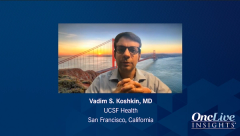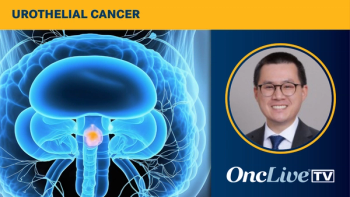
Encouraging Developments in Therapies for Relapsed/Refractory Advanced Bladder Cancer
Dr Benjamin Miron highlights data specific to treating patients with relapsed metastatic disease.
Episodes in this series
Benjamin Miron, MD: It’s hard to think about all the eventualities that could happen. A lot of times, you don’t have multiple opportunities for some patients, so you try to make the best decision that you can. That involves taking the data, which isn’t always based on the exact person in front of you. But sometimes you have to take into consideration the best data that you have and try to fit your patient to that data, both in consideration of the clinical factors that are relevant to the case and what each individual brings of themselves to that decision. Those are overwhelmingly huge factors in what you eventually do, because people have preferences, individual limitations, and wants and needs. That combined with what you know about their case, as far as data points go, help you make that decision.
Some people feel like you have to give your best therapy first. That’s probably what we all want to do, but we still try to stick with the data as best we can because that’s our anchor. As it develops, I’m very open to changing and adapting. It’s important to stay up to date and make those decisions based on growing knowledge. Especially in bladder cancer, there are a lot of data coming in all the time, and that all comes into play. Every person has their own situation, whether it be their medical conditions or who they are, and that all comes together. In bladder cancer, we also look at the toxicities and our patients’ comorbidities to decide on the best choice for that person.
If you’re not an expert on specific disease sites, the top line results are usually the things that come to you and are how you make your decisions. I personally think that most oncologists are motivated to do the best they can and pay attention as much as they can. There’s a lot happening and a lot of new data all the time. I don’t know if I’d necessarily change my practice based on a smaller trial in isolation. Some of that may not be relevant to every oncologist. It’s good to know and stay up to date, but ultimately, the larger studies and registration studies are what usually dictate practice on a larger scale.
People should try to stay up to date as much as they can. In urothelial cancer, there’s going to be much more nuance developing about the options. In treatment after maintenance therapy, there are a lot of considerations that you can think about for what you’d pick next. That may not be something that oncologists have been used to when they’re thinking about bladder cancer, but that will change with time and experience and hopefully with people engaging in case discussions and understanding other people’s perspectives. Maybe that could be a useful thing, too.
There’s a trial that has finished enrolling at Fox Chase Cancer Center [Philadelphia, Pennsylvania] called the RETAIN trial. There’s also RETAIN-2, which is another iteration of a similar concept. That’s really exciting because we always try to cure as many people as we can and maintain their quality of life as best we can. Those studies have that in mind and are trying to optimize—not sacrifice—clinical outcomes and improve quality of life and patient experiences after getting therapy. Those are the things I’m excited about.
We’re also doing a lot of investigations into biomarker work in the perioperative population and developing some trials using biomarkers in the metastatic setting. That’s a personal interest of mine, so I’ll plug that. We’re doing a lot of interesting things in bladder cancer. There’s so much going on in the field in general. I don’t know if I could summarize all of it, but it’s an exciting time. There are a lot more tools in the toolbox. That means that we need to figure out as a group how to best use and sequence them. That’s going to be a good problem to have now that things are developing more.
Transcript edited for clarity.









































